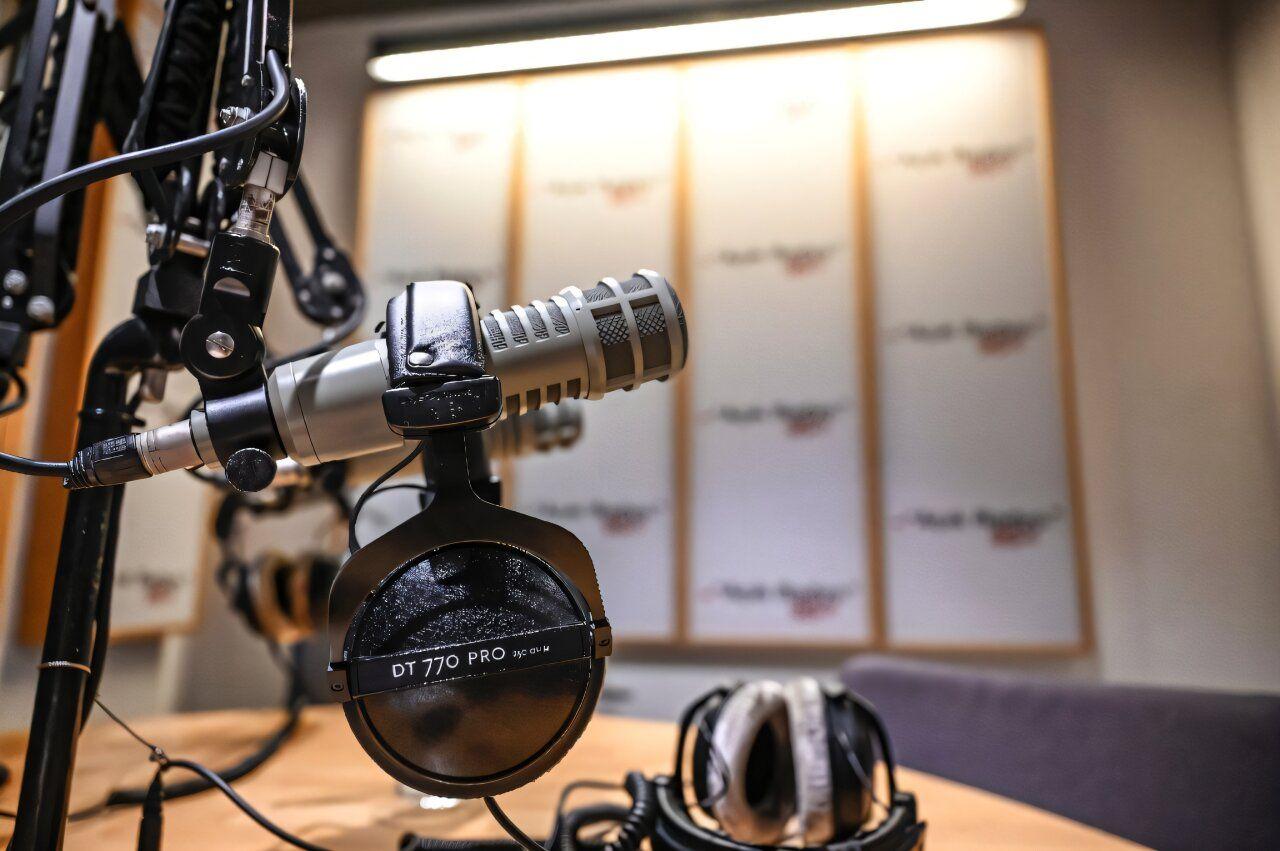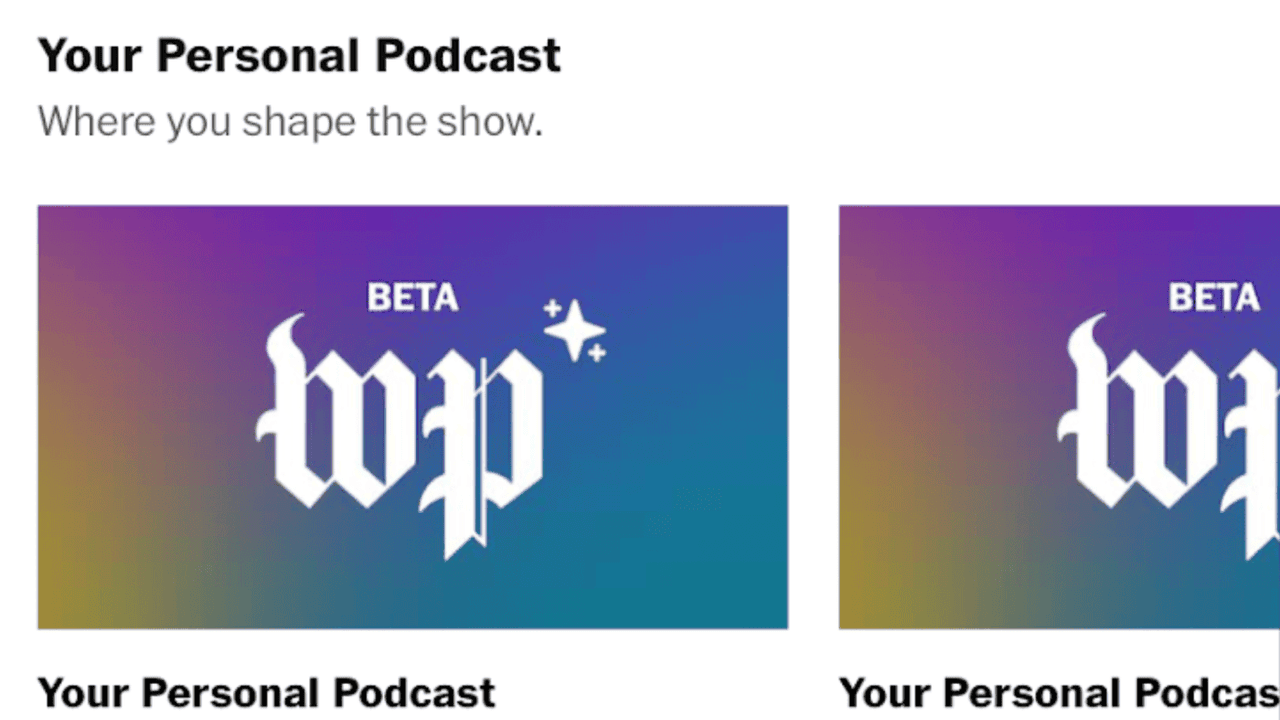AI-Generated Podcasts: Revolutionizing Content Creation or Threatening Industry Authenticity?
3 Sources
3 Sources
[1]
Mass-produced AI podcasts disrupt a fragile industry
Artificial intelligence now makes it possible to mass-produce podcasts with completely virtual hosts, a development that is disrupting an industry still finding its footing and operating on a fragile business model. Since Google launched Audio Overview, the first mass-market podcast generator that creates shows from documents and other inputs, just over a year ago, a wave of startups has rushed in, from ElevenLabs to Wondercraft. No studio, no humans at the microphone, not even a recording -- yet out comes a lively podcast, banter and all. Whether based on a legal document or a school handout, AI tools can deliver a state-of-the-art podcast at the click of a mouse. A pioneer in this movement is Inception Point AI, which was launched in 2023 and releases about 3,000 podcasts per week with a team of just eight people. The immediate goal is to play the volume game, said Jeanine Wright, Inception's founder and the former number two at leading audio studio Wondery. With each episode costing one dollar to produce, a mere 20 listens is enough to turn a profit. Automation has lowered the threshold for selling advertising space -- previously set at several thousand downloads. Wright gives the example of a "hyper-niche" program about pollen counts in a specific city, heard by a few dozen people that can attract antihistamine advertisers. With the rise of generative AI, many worry about synthetic content of poor quality -- often called "AI slop" -- flooding the internet, particularly social media. Inception mentions AI's role in every episode, a disclosure that generates "very little drop-off" among listeners, Wright told AFP. "We find that if people like the (AI) host and the content, then they don't care that it's AI-generated or they've accepted it." Finding an audience Martin Spinelli, a podcast professor at Britain's University of Sussex, decried a flood of content that will make it "harder for independent podcasters to get noticed and to develop a following" without the promotional budgets on the scale of Google or Apple. The expected surge in programming will also cut into the advertising revenue of non-AI podcasts. "If someone can make 17 cents per episode, and then suddenly they make 100,000 episodes, that 17 cents is going to add up," warned Nate DiMeo, creator of "The Memory Palace," a pioneering podcast for history buffs. The industry veteran, whose program began in 2008, said he's skeptical about the mass adoption of AI podcasts. But even if listener tastes don't change significantly, a glut of AI podcasts can "still impact the art form," independent podcasting where most programs are barely managing to stay afloat. Currently, the three major platforms -- Apple Podcasts, Spotify and YouTube -- don't require creators to disclose when a podcast was created by AI. "I would pay money for an AI tool that helps me cut through that noise," said Spinelli, who finds the streaming giants ineffective at connecting niche content with its target audience. Wright argues it's pointless to draw a dividing line between AI and non-AI content because "everything will be made with AI," to one degree or another. She does believe, however, that AI-generated podcasts with synthetic voices will emerge as a distinct genre -- somewhat like live-action films and animation, which have proven their storytelling potential and appeal over time. "People dismissing all AI-generated content as slop right now are being thoughtless, because there's a lot of great, compelling AI content that deserves their interest." DiMeo doesn't see it that way. He compares podcasting to reading a novel or listening to a song. You simply want to connect "with some other human consciousness," he said. "Without that, I find there's less reason to listen."
[2]
Mass-produced AI podcasts disrupt a fragile industry
New York (AFP) - Artificial intelligence now makes it possible to mass-produce podcasts with completely virtual hosts, a development that is disrupting an industry still finding its footing and operating on a fragile business model. Since Google launched Audio Overview, the first mass-market podcast generator that creates shows from documents and other inputs, just over a year ago, a wave of startups has rushed in, from ElevenLabs to Wondercraft. No studio, no humans at the microphone, not even a recording -- yet out comes a lively podcast, banter and all. Whether based on a legal document or a school handout, AI tools can deliver a state-of-the-art podcast at the click of a mouse. A pioneer in this movement is Inception Point AI, which was launched in 2023 and releases about 3,000 podcasts per week with a team of just eight people. The immediate goal is to play the volume game, said Jeanine Wright, Inception's founder and the former number two at leading audio studio Wondery. With each episode costing one dollar to produce, a mere 20 listens is enough to turn a profit. Automation has lowered the threshold for selling advertising space -- previously set at several thousand downloads. Wright gives the example of a "hyper-niche" program about pollen counts in a specific city, heard by a few dozen people that can attract antihistamine advertisers. With the rise of generative AI, many worry about synthetic content of poor quality -- often called "AI slop" -- flooding the internet, particularly social media. Inception mentions AI's role in every episode, a disclosure that generates "very little drop-off" among listeners, Wright told AFP. "We find that if people like the (AI) host and the content, then they don't care that it's AI-generated or they've accepted it." Martin Spinelli, a podcast professor at Britain's University of Sussex, decried a flood of content that will make it "harder for independent podcasters to get noticed and to develop a following" without the promotional budgets on the scale of Google or Apple. The expected surge in programming will also cut into the advertising revenue of non-AI podcasts. "If someone can make 17 cents per episode, and then suddenly they make 100,000 episodes, that 17 cents is going to add up," warned Nate DiMeo, creator of "The Memory Palace," a pioneering podcast for history buffs. The industry veteran, whose program began in 2008, said he's skeptical about the mass adoption of AI podcasts. But even if listener tastes don't change significantly, a glut of AI podcasts can "still impact the art form," independent podcasting where most programs are barely managing to stay afloat. Currently, the three major platforms -- Apple Podcasts, Spotify and YouTube -- don't require creators to disclose when a podcast was created by AI. "I would pay money for an AI tool that helps me cut through that noise," said Spinelli, who finds the streaming giants ineffective at connecting niche content with its target audience. Wright argues it's pointless to draw a dividing line between AI and non-AI content because "everything will be made with AI," to one degree or another. She does believe, however, that AI-generated podcasts with synthetic voices will emerge as a distinct genre -- somewhat like live-action films and animation, which have proven their storytelling potential and appeal over time. "People dismissing all AI-generated content as slop right now are being thoughtless, because there's a lot of great, compelling AI content that deserves their interest." DiMeo doesn't see it that way. He compares podcasting to reading a novel or listening to a song. You simply want to connect "with some other human consciousness," he said. "Without that, I find there's less reason to listen."
[3]
Mass-produced AI podcasts disrupt a fragile industry
Artificial intelligence now makes it possible to mass-produce podcasts with completely virtual hosts, a development that is disrupting an industry still finding its footing and operating on a fragile business model. Since Google launched Audio Overview, the first mass-market podcast generator that creates shows from documents and other inputs, just over a year ago, a wave of startups has rushed in, from ElevenLabs to Wondercraft. No studio, no humans at the microphone, not even a recording -- yet out comes a lively podcast, banter and all. Whether based on a legal document or a school handout, AI tools can deliver a state-of-the-art podcast at the click of a mouse.
Share
Share
Copy Link
The rise of AI-generated podcasts is disrupting the fragile podcast industry, offering mass production capabilities but raising concerns about content quality and the future of human-created shows.
The Rise of AI-Generated Podcasts
Artificial Intelligence (AI) has made a significant leap in the world of podcasting, enabling the mass production of shows with virtual hosts. This technological advancement is causing a stir in an industry that is still evolving and operates on a delicate business model
1
.The catalyst for this transformation was Google's launch of Audio Overview, the first mass-market podcast generator capable of creating shows from various inputs such as documents. This innovation has sparked a wave of startups entering the market, including ElevenLabs and Wondercraft
1
3
.Inception Point AI: Pioneering AI-Driven Podcast Production
A standout player in this new landscape is Inception Point AI, founded in 2023. With a team of just eight people, the company produces an astounding 3,000 podcasts per week. Jeanine Wright, the founder and former executive at leading audio studio Wondery, explains that their strategy focuses on volume
1
.The economics of AI-generated podcasts are compelling. Each episode costs only one dollar to produce, and profitability is achieved with just 20 listens. This efficiency has lowered the threshold for selling advertising space, previously requiring several thousand downloads .
Impact on the Podcast Industry
The advent of AI-generated podcasts has raised concerns about content quality and its effect on the existing podcast ecosystem. Martin Spinelli, a podcast professor at the University of Sussex, warns that the flood of AI content could make it harder for independent podcasters to gain traction without substantial promotional budgets
1
.
Source: Tech Xplore
Nate DiMeo, creator of the pioneering podcast "The Memory Palace," expresses skepticism about the mass adoption of AI podcasts. He argues that even if listener preferences don't shift dramatically, the sheer volume of AI-generated content could impact the art form of independent podcasting
1
.Related Stories
The Future of AI in Podcasting
Despite concerns, proponents of AI-generated podcasts see potential for the technology to carve out its own niche. Wright believes that AI-generated podcasts with synthetic voices will emerge as a distinct genre, similar to how animation coexists with live-action films
1
.However, the human element remains a crucial factor for many. DiMeo compares podcasting to reading a novel or listening to a song, emphasizing the desire to connect with human consciousness. This perspective highlights the ongoing debate about the role of AI in content creation and consumption
1
.References
Summarized by
Navi
[1]
[2]
[3]
Related Stories
AI-Generated Podcasts: The Rise of Inception Point AI and the Future of Audio Content
10 Sept 2025•Technology

Google's NotebookLM: Revolutionizing Content Creation with AI-Generated Podcasts
03 Oct 2024•Technology

Washington Post AI podcast faces backlash as journalists call it an error-laden disaster
13 Dec 2025•Technology

Recent Highlights
1
Google Gemini 3.1 Pro doubles reasoning score, beats rivals in key AI benchmarks
Technology

2
Meta strikes up to $100 billion AI chips deal with AMD, could acquire 10% stake in chipmaker
Technology

3
Pentagon threatens Anthropic with supply chain risk label over AI safeguards for military use
Policy and Regulation





